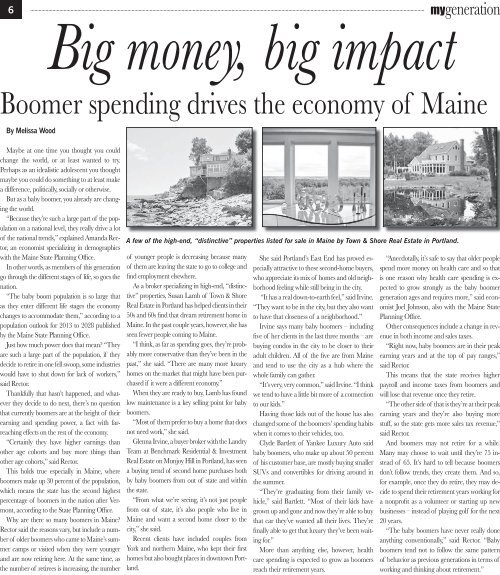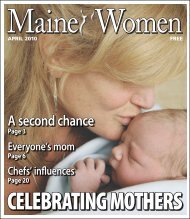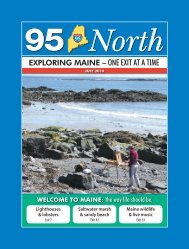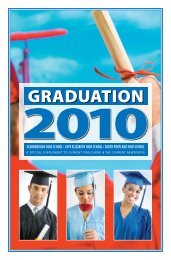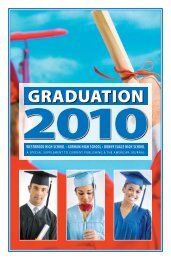My Generation August 2010 - Keep Me Current
My Generation August 2010 - Keep Me Current
My Generation August 2010 - Keep Me Current
You also want an ePaper? Increase the reach of your titles
YUMPU automatically turns print PDFs into web optimized ePapers that Google loves.
6<br />
By <strong>Me</strong>lissa Wood<br />
Big money, big impact<br />
Boomer spending drives the economy of Maine<br />
Maybe at one time you thought you could<br />
hange the world, or at least wanted to try.<br />
erhaps as an idealistic adolescent you thought<br />
aybe you could do something to at least make<br />
difference, politically, socially or otherwise.<br />
But as a baby boomer, you already are changing<br />
the world.<br />
“Because they’re such a large part of the population<br />
on a national level, they really drive a lot<br />
of the national trends,” explained Amanda Rector,<br />
an economist specializing in demographics<br />
with the Maine State Planning Offi ce.<br />
In other words, as members of this generation<br />
go through the different stages of life, so goes the<br />
nation.<br />
“The baby boom population is so large that<br />
as they enter different life stages the economy<br />
changes to accommodate them,” according to a<br />
population outlook for 2013 to 2028 published<br />
by the Maine State Planning Offi ce.<br />
Just how much power does that mean? “They<br />
are such a large part of the population, if they<br />
decide to retire in one fell swoop, some industries<br />
would have to shut down for lack of workers,”<br />
said Rector.<br />
Thankfully that hasn’t happened, and whatever<br />
they decide to do next, there’s no question<br />
that currently boomers are at the height of their<br />
earning and spending power, a fact with farreaching<br />
effects on the rest of the economy.<br />
“Certainly they have higher earnings than<br />
other age cohorts and buy more things than<br />
other age cohorts,” said Rector.<br />
This holds true especially in Maine, where<br />
boomers make up 30 percent of the population,<br />
which means the state has the second highest<br />
percentage of boomers in the nation after Vermont,<br />
according to the State Planning Offi ce.<br />
Why are there so many boomers in Maine?<br />
Rector said the reasons vary, but include a number<br />
of older boomers who came to Maine’s summer<br />
camps or visited when they were younger<br />
and are now retiring here. At the same time, as<br />
the number of retirees is increasing, the number<br />
A few of the high-end, “distinctive” properties listed for sale in Maine by Town & Shore Real Estate in Portland.<br />
of younger people is decreasing because many<br />
of them are leaving the state to go to college and<br />
fi nd employment elsewhere.<br />
As a broker specializing in high-end, “distinctive”<br />
properties, Susan Lamb of Town & Shore<br />
Real Estate in Portland has helped clients in their<br />
50s and 60s fi nd that dream retirement home in<br />
Maine. In the past couple years, however, she has<br />
seen fewer people coming to Maine.<br />
“I think, as far as spending goes, they’re probably<br />
more conservative than they’ve been in the<br />
past,” she said. “There are many more luxury<br />
homes on the market that might have been purchased<br />
if it were a different economy.”<br />
When they are ready to buy, Lamb has found<br />
low maintenance is a key selling point for baby<br />
boomers.<br />
“Most of them prefer to buy a home that does<br />
not need work,” she said.<br />
Glenna Irvine, a buyer broker with the Landry<br />
Team at Benchmark Residential & Investment<br />
Real Estate on Munjoy Hill in Portland, has seen<br />
a buying trend of second home purchases both<br />
by baby boomers from out of state and within<br />
the state.<br />
“From what we’re seeing, it’s not just people<br />
from out of state, it’s also people who live in<br />
Maine and want a second home closer to the<br />
city,” she said.<br />
Recent clients have included couples from<br />
York and northern Maine, who kept their fi rst<br />
homes but also bought places in downtown Portland.<br />
She said Portland’s East End has proved especially<br />
attractive to these second-home buyers,<br />
who appreciate its mix of homes and old neighborhood<br />
feeling while still being in the city.<br />
“It has a real down-to-earth feel,” said Irvine.<br />
“They want to be in the city, but they also want<br />
to have that closeness of a neighborhood.”<br />
Irvine says many baby boomers – including<br />
fi ve of her clients in the last three months – are<br />
buying condos in the city to be closer to their<br />
adult children. All of the fi ve are from Maine<br />
and tend to use the city as a hub where the<br />
whole family can gather.<br />
“It’s very, very common,” said Irvine. “I think<br />
we tend to have a little bit more of a connection<br />
to our kids.”<br />
Having those kids out of the house has also<br />
changed some of the boomers’ spending habits<br />
when it comes to their vehicles, too.<br />
Clyde Bartlett of Yankee Luxury Auto said<br />
baby boomers, who make up about 50 percent<br />
of his customer base, are mostly buying smaller<br />
SUVs and convertibles for driving around in<br />
the summer.<br />
“They’re graduating from their family vehicle,”<br />
said Bartlett. “Most of their kids have<br />
grown up and gone and now they’re able to buy<br />
that car they’ve wanted all their lives. They’re<br />
fi nally able to get that luxury they’ve been waiting<br />
for.”<br />
More than anything else, however, health<br />
care spending is expected to grow as boomers<br />
reach their retirement years.<br />
“Anecdotally, it’s safe to say that older people<br />
spend more money on health care and so that<br />
is one reason why health care spending is expected<br />
to grow strongly as the baby boomer<br />
generation ages and requires more,” said economist<br />
Joel Johnson, also with the Maine State<br />
Planning Offi ce.<br />
Other consequences include a change in revenue<br />
in both income and sales taxes.<br />
“Right now, baby boomers are in their peak<br />
earning years and at the top of pay ranges,”<br />
said Rector.<br />
This means that the state receives higher<br />
payroll and income taxes from boomers and<br />
will lose that revenue once they retire.<br />
“The other side of that is they’re at their peak<br />
earning years and they’re also buying more<br />
stuff, so the state gets more sales tax revenue,”<br />
said Rector.<br />
And boomers may not retire for a while.<br />
Many may choose to wait until they’re 75 instead<br />
of 65. It’s hard to tell because boomers<br />
don’t follow trends, they create them. And so,<br />
for example, once they do retire, they may decide<br />
to spend their retirement years working for<br />
a nonprofi t as a volunteer or starting up new<br />
businesses – instead of playing golf for the next<br />
20 years.<br />
“The baby boomers have never really done<br />
anything conventionally,” said Rector. “Baby<br />
boomers tend not to follow the same pattern<br />
of behavior as previous generations in terms of<br />
working and thinking about retirement.”


